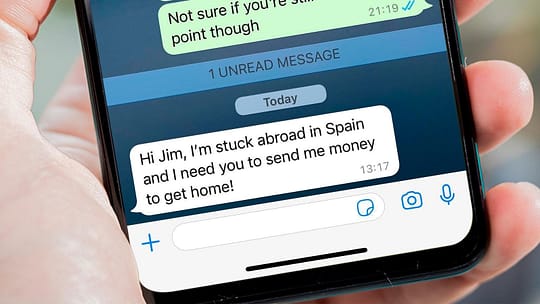What can you do to protect yourself against WhatsApp scams? The main signs to look for include bad English, an unknown number, or a catfishing e-mail. You can also report messages to WhatsApp by long-pressing them to open their context menu. These signs are a surefire way to detect a fake message. And don’t forget to always block messages from unknown sources if you feel suspicious. Here are some tips for spotting a fake message on WhatsApp:
Catfishing
If you’ve been a victim of a catfish, you know that it’s a big problem these days. Scammers have become so sophisticated, teams will operate from ‘call centres’ and internet cafes, which are typically in remote locations in West Africa or India. They will also manage each other’s phone numbers, so they don’t have to risk your personal details. However, there are ways to protect yourself.
First of all, report unsolicited business messages on WhatsApp. To report a spammer, open the chat, tap on the person’s name, and then click on the ‘Report Contact’ button. Alternatively, block the number and any other contacts they’ve added through the scam. If this doesn’t work, you can also report the scammer to Action Fraud and the Internet Crime Complaint Center.
To protect yourself from being a victim of a catfishing scam, always remember to keep your distance and never meet the person in real life. Often, a catfisher will ask for money very early on in a relationship, or even ask for money to buy plane tickets. While you may initially give the catfish a small amount to help you get started, they’ll gradually ask for more money.
A catfisher may pose as someone with a high-level job or a family with lots of money. They may also create a fake profile on several social networks and shape their identity to look like you’re an expert in a certain field. They might insist on video chats, insist on meeting in person, or otherwise try to convince you to become their next victim. You can also ask questions and make sure you’re comfortable with them.
Poor English
If you have ever received a WhatsApp scam message, you might wonder if it was a real person or a scam. However, there are signs to look for. If the person uses poor English, it may be a warning sign of a fraud. While some fraudsters may come from less-developed countries or be not as well educated as you, it’s likely that they rely on translation tools or apps to communicate with victims. Their language may seem “off.”
Unrecognized number
Hackers can obtain random WhatsApp contact numbers using social engineering techniques. A victim receives a call from an unknown number, who attempts to convince him to initiate a call with another number. Cybersecurity researchers have not figured out how hackers accomplish this task, but it is possible that they would ask for a financial reward if they could get access to the victim’s data. To avoid falling victim to this scam, he must follow the instructions of the caller.
One warning sign of a scam: the person behind the number may have poor English. Because these people may be from less developed nations, their communication skills may be limited. They may use a translation tool or app to disguise their language. Nonetheless, their language may be “off.” Aside from that, scammers may be using WhatsApp as a platform to catfish. Therefore, it is imperative to stay alert and report suspicious contacts or groups.
If the caller asks you to transfer money, he will typically request the recipient’s bank account information. In addition to requesting bank account details, these scammers will ask you to transfer money to an account they have set up. The message will contain a link that directs the recipient to a fake website that will not let them withdraw the money. While it might be tempting, it is important to know how to recognize these scams and protect yourself.
Another common WhatsApp scam involves fraudulent websites attempting to steal your banking details. Such scammers use an external link that redirects the recipient to a survey page where they ask for sensitive information. This information can be used for identity theft or sold to third parties. To avoid this scam, never download an unofficial version of WhatsApp. If you do, you’re vulnerable to malware. In many cases, these websites will send a link to a download page.
Asking for credit card details
A recent Whatsapp scam has targeted victims with impersonated relatives, telling them they need money to pay for a new phone. The scammers use fake phone numbers to trick victims into giving them their credit card details and bank account information. Scammers also pose as the police, government or banks to get the details they need. If you find yourself being targeted by a scammer, here are a few things you can do to protect yourself.
The first step in protecting yourself against WhatsApp scams is to learn how to spot these messages. The spam that appears on WhatsApp is almost always aimed at getting you to click on a link that looks legitimate, but in reality is a malicious link. The malicious link will attempt to obtain your credit card or banking information, or log-in credentials. The best way to prevent being scammed is to make sure you never give out your private information, and never click on a link from an unfamiliar source.
It’s easy to identify a fake WhatsApp account, but how do you tell if the account is real? Look for the green verification symbol, which is a white check mark on a green background, next to the account’s name. If the message looks too good to be true, delete the message and block the contact. In addition to blocking these people, be sure to set up two-step verification on your account. Once you’ve set this up, you should be more protected than ever.
The State Bank of India has warned users to watch out for messages posing as the State Bank of India. These messages ask for sensitive information, including credit card numbers and One-Time-Password. They also pose as reputable companies, but the messages are scams – and they’re not authentic! Make sure you check out the official websites before you give your personal information. So be cautious and be aware of this Whatsapp scam asking for credit card details
Working external links
A WhatsApp scam that is using working external links to get personal information from its victims has been spreading over the Internet. These scammers are using this feature to get sensitive information from unsuspecting users. This method is particularly prevalent during the New Year and holiday seasons when many people are distracted by the lure of government subsidies. The scammers are initiating conversations with WhatsApp users and extracting vital information from them. As a result, users are being hacked as a result of clicking on these links.
Another common WhatsApp scam involves the use of external links. These links can be easily distributed through WhatsApp and are designed to direct users to a survey. This survey is designed to lure victims into giving out sensitive information which can be stolen or sold to a third party. The following steps should be taken if you receive a scam message. Once you’ve identified the scam, you can respond with caution to protect yourself and avoid falling victim to the scam.
Another common WhatsApp scam involves fake news websites. These sites claim to be legitimate news websites, but in reality, the fake link is a scam. The scammers trick users into entering personal information such as their credit card number. The information they collect can be used for identity theft and sell to third parties. As a result, it is crucial to check the validity of any link before you click on it. A scam website may have several different variations.




